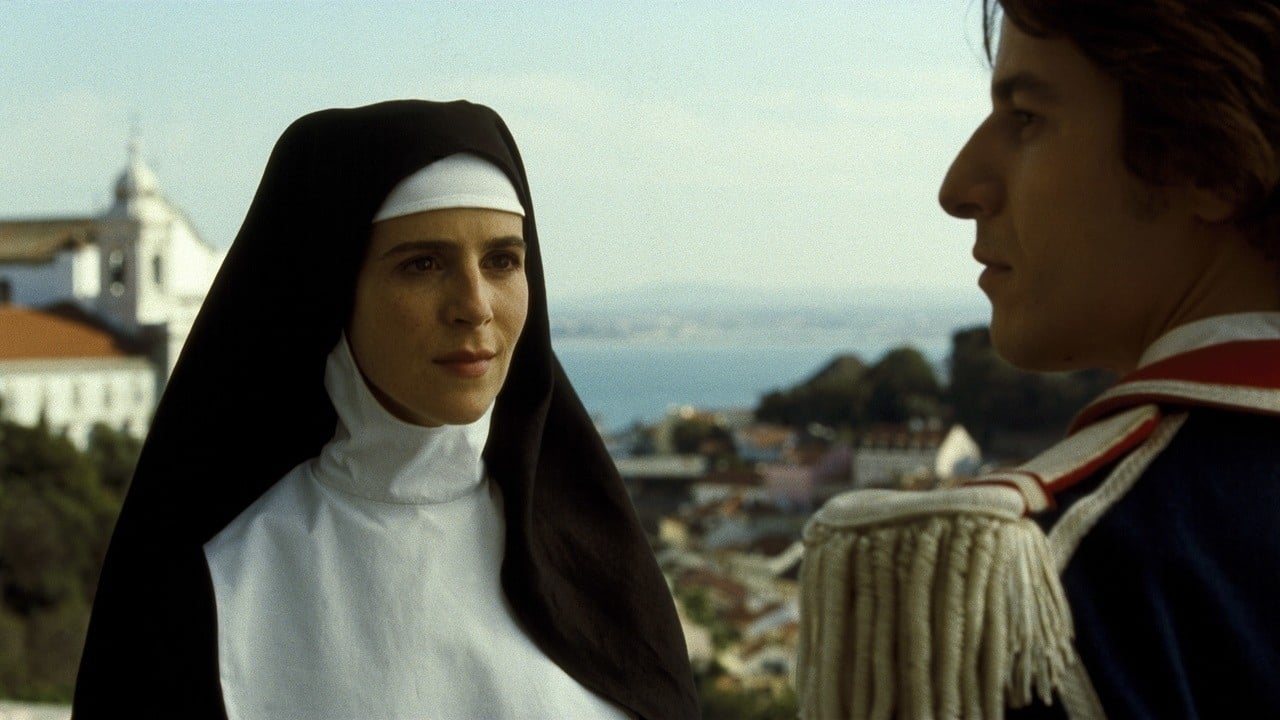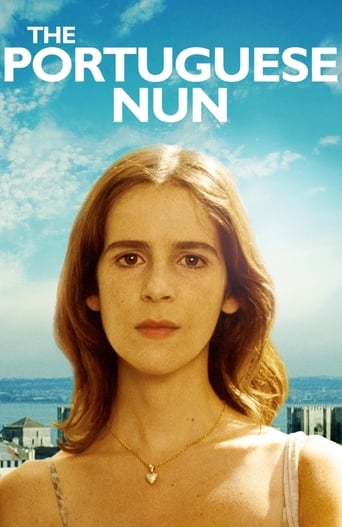SparkMore
n my opinion it was a great movie with some interesting elements, even though having some plot holes and the ending probably was just too messy and crammed together, but still fun to watch and not your casual movie that is similar to all other ones.
CrawlerChunky
In truth, there is barely enough story here to make a film.
Darin
One of the film's great tricks is that, for a time, you think it will go down a rabbit hole of unrealistic glorification.
Cheryl
A clunky actioner with a handful of cool moments.
Kim Harris
I watched this on the excellent MuBI Internet movie channel and found it an intriguing look at personal relationships. It has a very leisurely pace and there is no "action" but it is beautifully filmed and the scenes of Lisbon are beguiling. The dialogue and motion of the actors is deliberately stylised and there is much looking directly at the camera. Also the framing of dialogue between pairs of characters is unconventional; it shows each speaker full face in turn. Nevertheless, if you can cope with such lack of cinematic convention, it's an enjoyable piece. The Portuguese language is beautiful, to say nothing of the protagonist played by Leonor Baldaque.
Miguel Reis-Abreu
It was so bad that I saw everything just to mock. Postcard after postcard, this movie should be seen at home where friends can gather and make fun of it. I guess the actors are not proud of it and like all of us, just have bills to pay. At first, I though that it was a kind of first film experience, where the director tries some things like filming with candles... but no. It's not a student's first work. It's just a really bad movie, with poor and stupid dialogs and long and boring scenes. There's a kid they say it's 6yo, who already has full and definitive teeth, and a 40yo count, that is at least 60. Next to this, friends holiday movies are a must see!
oOgiandujaOo_and_Eddy_Merckx
The Portuguese Nun follows Julie, a Parisienne actress who is taking part in a location shoot in Lisbon. It's feels like an investigation of roots for her as her parents are a Portuguese and a French Basque and she was brought up to be bilingual. The film within the film is being shot with a small crew and only one other actor. Director Eugène Green plays the director in the film. The main theme of the movie, for me, appears to be finding happiness and making peace, and there's a lot of philosophy about love. Due to the extreme slow pace of the movie and the deliberately stilted acting, plus some challenging material there is every chance that you could view this movie as the apogee of pretension. My advice is to stay with it and give it every chance.Knowledge of the Portuguese legend of O Desejado, sixteenth century King Sebastião I is of help. It has been believed that one day he will return to rescue Portugal in a time of crisis. For Eugène Green the crisis is a spiritual one, he has spoken of a world that seems like a "conglomeration of fragments with no connection between them".There are also several points during the film when Green films Fado singers doing whole numbers, Green has said, "This musical and poetical form represents what is most essential in Portuguese culture: the meeting, in the present, of memory and desire, of past and future".I think another difficulty in terms of the unexpected, is that the movie is in large part concerning the female experience, especially of love, which isn't something you usually see in film, albeit you get a lot of male fantasies about women's experience of love. I think Julie for example has a problem that many women have of only having relationships with a particular type of man, a type that's often not positive for them. Men on the other hand seem to have a lot more versatility in terms of affection. There's also this idea of love in the film, from Plato's Symposium (Diotima's dialogue) that it's a stepping stone towards a contemplation of God and his love, that these types of love are the same and differ only in terms of quality. Thus the Portuguese Nun in the film within a film is inspired by her love for a man that she knows can never be fulfilled.The dialogues in the film are very stylised, and try to remove manipulative body language and also rhetoric. They're also quite slow so that you can really absorb what's said. I think the it's a mark of the director's respect for the characters, and it the movie thus comes across as incredibly humane. The technique is Brechtian, and makes sure you don't identify emotionally with the characters. The Portuguese Nun is a very successful film on that level, in the way in which it promotes self reflection.Some of the film's message I find very difficult to absorb, I think for example that learning to love what isn't yourself and to love all people, is a very noble thing, but it isn't the panacea the film would have you believe. In this life one generally has to learn to be tough. Thespians on the other hand can probably afford such a lifestyle. I would say this is a lacuna for Eugène Green.I quite liked a point about egotism that the film made, that actually offering to do someone a favour often comes down to egotism as much as the most overt act of selfishness, and I enjoyed pondering what life without egotism would actually be like.I was also driven to think about polygamy and the selfishness of sexual jealousy. So I think the movie is really a chocolate box for the soul and doesn't necessarily have one particular focus. Particularly also liked the comments about how reason was a bad thing and the enemy of God.At one point I was a little bit worried of a rehash of Viridiana, when a quite unrealistic aristocratic character is introduced who has not had the courage to do anything with his talents, very reminiscent of Buñuel's Don Jaime. Also we have a rather unorthodox look at nuns. If anyone is interested in filmic cross-hybridisations of Portuguese and French culture, you could do far worse than seek out West Point (2007 - Laurence Rebouillon).
Matthew Stechel
Film is a pretty but sluggish walk through Lisbon as this actress is in town to shoot a film about a nun who falls in mad passionate love with a sailor on leave. The actress wanders around Lisbon at night and finds an actual nun who seems to never leave a kneeling position at the altar of one of the churches she comes across in her wanderings. The actress then starts obsessing about said nun, as well as having several encounters with various men of Lisbon--and none of the amorous kind which is all the more surprising given how pretty the leading actress is. That's more or less it in terms of plot--but the plot is besides the point here.The point (i think) is about how the life force of a city can influence the life force of its citizenry--and how this can have a great affect on any visitors looking to get lost amongst its peoples. Its not a bad watch--Lisbon is shot very very nicely throughout--and the leading actress while not getting to really express anything beyond vague sentiments about destiny and fate and the like is pleasant enough company for the two or so hours running time.She does have a horrible habit of looking directly and intently into the camera--seemingly at the audience in various shots throughout the film. That this happens repeatedly throughout is obviously meant as a directorial touch--but one that becomes rather irritating the more its repeated (irritating that is until it becomes funny because it happens so often enough that it soon becomes several characters who once they finish speaking end up starting intently into the camera--almost as if they're daring us to disagree with what they just said!) The pacing of the film while deliberate is definitely of the slow kind. Its not bad if you're looking for a nice leisurely wander through Lisbon--but its not as if much happens...and yet i was hardly bored while watching it. Film is somewhat captivating as the hypnotically good looking leading lady walks around staring at things and taking in the locals and customs. Film actually reminded me of Jim Jarmusch's Limits of Control where despite differences in genders and professions, both films are essentially about its main characters killing time between jobs wandering around a city and trying to take in the specific time and place of a specific culture--and its citizenry. On that front its definitely successful.

